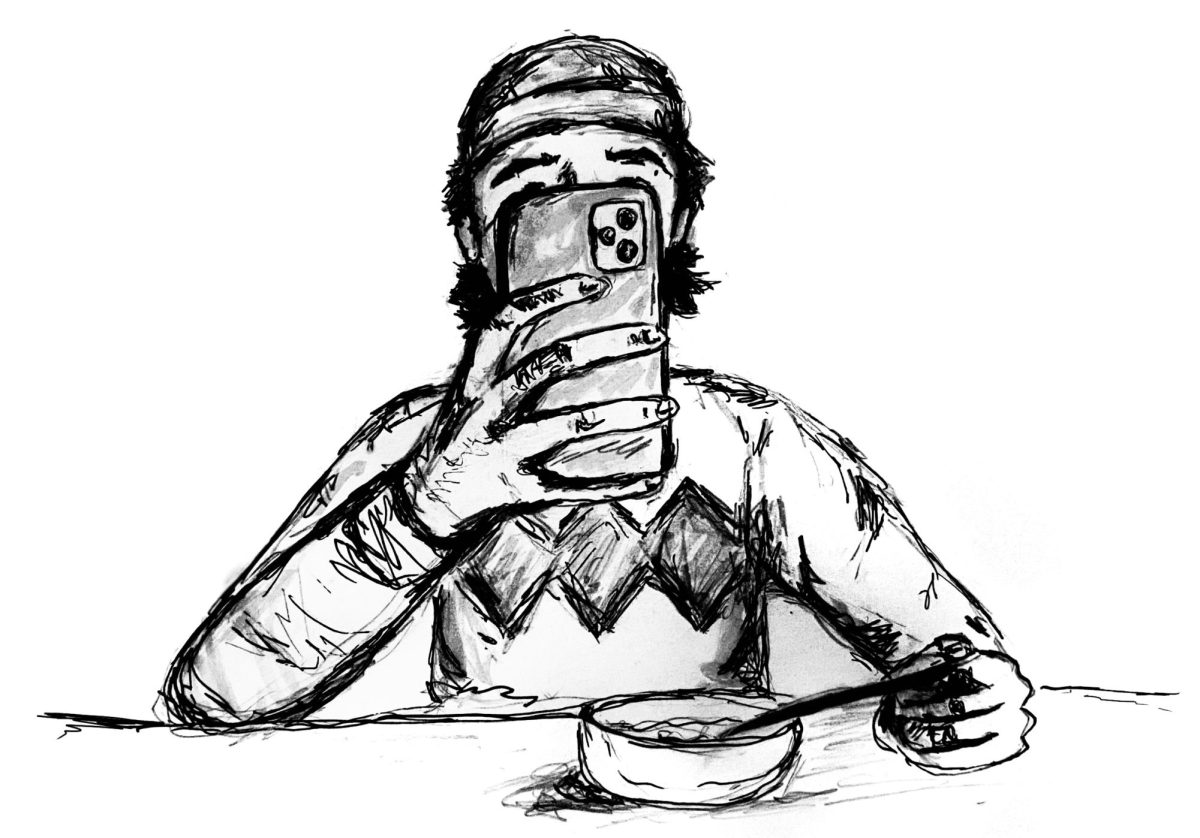With technology’s transition into every aspect of life, iPad kids are quickly growing into screenagers.
Everywhere I look, people are glued to their screens or locked into their headphones, whether they are walking alone or in a group.
Everyone has fallen victim to phone addiction at some point; it’s nothing to be ashamed of.
Sophomore Abby Stevens spoke about the compulsion to check her phone.
“Even though I have my phone on Do Not Disturb, I still feel compelled to check for notifications due to FOMO on what might be going on. It’s an unhealthy habit I want to break, but it feels impossible since I’m never without my phone,” said Stevens.
Phones were purposefully designed to be addictive, according to a June 6 article by Addiction Center. There is intention behind their bright colors, sounds and vibrations.
Whether you’ve gotten the “Stop! You’ve been scrolling too long” video pop up on your TikTok for you page or have completely zoned out of a conversation with your friend after getting a text message, we’ve all been there.
Nevertheless, we need to stop falling into these patterns that are destroying the real world connections we can make.
Because I was born into Generation Z, I have no real perspective of what it was like before technology and phones. Like many of my peers, my attention span has taken a hit, likely due to a constant focus on screens.
The attention span of Gen Z has been measured at around eight seconds compared to millennials at around twelve seconds, according to a July 2022 article by Colormatics.
This could explain why it is a bit harder for our generation to stay present in conversation or to pay attention, but we should not let this discourage us from trying.
We should no longer allow our phones to dictate so much of our lives. We are giving them too much power.
I have had friends who would always be on their phone when we were together, either scrolling on social media or texting someone else. Their lack of presence made me feel like they wanted to be somewhere else.
These sort of behaviors can affect even the strongest of relationships. Feeling like the people closest to you would rather be on their phone can create resentment.
I began to compare myself to the people my friends were texting or the Instagram photos they would look at in a very negative way.
I shouldn’t have to fight the entirety of the internet just to receive the smallest amount of attention from someone who is supposed to be a close friend.
If you are constantly immersed in your cell phone while getting a meal with someone or just hanging out, it comes off as rude or insincere.
If we aren’t going to engage within a social setting, there is no point in going. If you just want to be on your phone then stay home and do that.
The importance and worship placed upon these small objects is creating a rift between realities.
A day can be ruined by an Instagram post or a snap being left on delivered for too long when in hindsight, these things feel kind of silly.
I feel a distinct difference between my real self and my online presence. Technology has created two separate entities of my existence that can not exist at the same time.
My Instagram feed consists of photos of my friends and me going out on weekends or other photos I just find to be funny.
These images I’m putting out just feel like such a small part of me that people I don’t even know will perceive as my entire being.
By giving so much time and energy to our phones, we are essentially erasing part of ourselves and forfeiting the world around us.
My advice: step back. Take a break. The worst thing you could miss is a funny TikTok video or a friend’s Instagram post. It will not be the end of the world.
However, too much screen time could be.
Recent researchers have found that those who suffer from phone addiction have diminished gray matter, similar to those who struggle with drug addiction, according to the Addiction Center article.
Gray matter is an essential tissue in our brains that plays a significant role in mental functions, memory, emotions and movement according to a March 19 article by Cleveland clinic.
By allowing these behaviors to continue, we are only further isolating ourselves. There is so much more to life than seeing what other people are doing.
Yes, it’s okay to scroll sometimes and even perfectly normal to lose yourself on your phone for a bit, but it should not be a recurring problem.
If we continue to place so much of our time and self-identity on our screens, we will miss out on what is happening in front of us.
The culture behind phone etiquette is deteriorating the things that were once held important, like time spent with loved ones.
Awareness is an important aspect of everyone’s life, whether it is being present with others or yourself. We cannot continue to hold such worth in our phones and our perception of ourselves within them.








